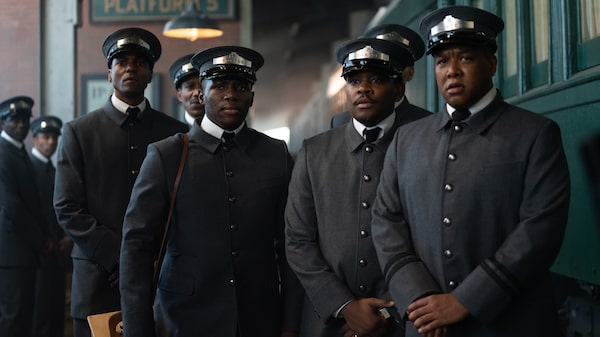
Ronnie Rowe Jr. (left) as Zeke and Aml Ameen (second right) as Junior in a scene from CBC's The Porter.Shauna Townley/CBC via The Canadian Press
The advance blurbs for The Porter (starts Monday, CBC, 9 p.m., streams on CBC Gem) are all about the significance and importance of the series: it is the largest Black-led production in the history of Canadian TV and it tells the story of a portion of our history that has been ignored or put at the back of the shelf.
All of this is true, but blurbs are not reviews and the audience is often wary of productions that, they’re told, are good for them because a social cause is being pushed forward. Besides, at a time when there’s an avalanche of TV every month, viewers are both picky and skeptical.
Happy to report here that The Porter is great TV; an eight-episode drama teeming with compelling characters and a series that’s deeply committed to making the trials and tribulations of its characters part of an entertaining, hectic world fuelled by music, talent and ambition. This is less a history lesson, dramatized interpretation of real events, than it is a sizzling, sexy drama about people you want to root for and follow.
The Porter is an overdue win for Black representation on Canadian TV
The opening of the first episode establishes the tone and style with aplomb. We’re told we are in Montreal in 1921. In a nightclub, Black customers are silent and tense while a white police officer walks around arrogantly, pausing to take a bottle of liquor from a customer’s table. A man we come to know as Junior Massey (Aml Ameen) holds onto the bottle and gives the cop a look that would kill. The guy beside him, one Zeke Garrett (Ronnie Rowe Jr.), advises Junior to cool it. We see another cop walk around counting what we can assume is bribe money. When the police leave, the club’s owner, Popsy (Kevin Hanchard) snaps his fingers and the club explodes into music and dance.
The scene beautifully sets up not just the storyline – Junior and Zeke are two men who will follow different paths, both fraught – but also the mood and energy of the series. If the scene of the cop counting the money looks a little stagey (just as a later scene of railway porters going to work looks highly stylized), it is meant to be. What The Porter manages to pull off is the magic trick of having the drumbeat energy of musical theatre balanced with a searing drama about race, community, workers’ rights and class division.
Inspired by, but not relying pedantically on, real events, the series presents train porters Junior and Zeke as young men with different types of ambition. Junior understands the power of money and will do anything to accumulate it, even messing with gangsters more powerful than him. Zeke, inspired by both his job experience and the words of activists, wants brotherhood in the form of a union of Black porters. Junior’s wife Marlene (Mouna Traoré) is a nurse and wonders if her work is actually making a difference. At the nightclub, where much of the rhythm of the drama is anchored, Lucy (Loren Lott) has a performer’s ruthless need to succeed and, well, breaks a few hearts along the way. Right there are the two impulses: self or community.
“The visual oomph is spectacular (directed by Charles Officer and R.T. Thorne, created by Arnold Pinnock and Bruce Ramsay, with Annmarie Morais, Marsha Greene and Aubrey Nealon), a deliberate framing of the story as both history brought ostentatiously to life, and a stark sense of a colour divide. In the matter of the latter, we are given a clear sense of how trapped the railway porters are. The inciting incident in the early going is the death of a young man in a work accident. The railway sends a bill for his uniform to his family.
Catch up on the best streaming TV of 2021 with our holiday guide
It is true that Canadian railway porters started the first Black labour union in North America, but that’s merely the launching pad for an emotionally dense roller coaster of a ride. The series touches on the impact of the First World War on Canada, from the individual experience of soldiers to the sense that Canada was emerging as a country. It’s also about the 1920s as an era of huge change; it’s a jazz-age drama that captures the ferocious, chaotic energy of the period. It’s about bootlegging, brothels and dancehalls.
There is a vast cast and from the evidence of the first few episodes there isn’t a false note in it. What night seem like contradictory moods – the joy in the Black community we enter, with the music, love, passion and romance, and on the other hand the deeply serious matter of Black workers fighting exploitation and racism – are joined nicely. Amazingly, given all that is packed into it, The Porter is one sexy show. And that’s not a blurb, that’s a rave review.
Plan your screen time with the weekly What to Watch newsletter. Sign up today.